Your septic tank can create huge problems when it gets sick. Keep it healthy by never introducing these items into your drains or toilets.
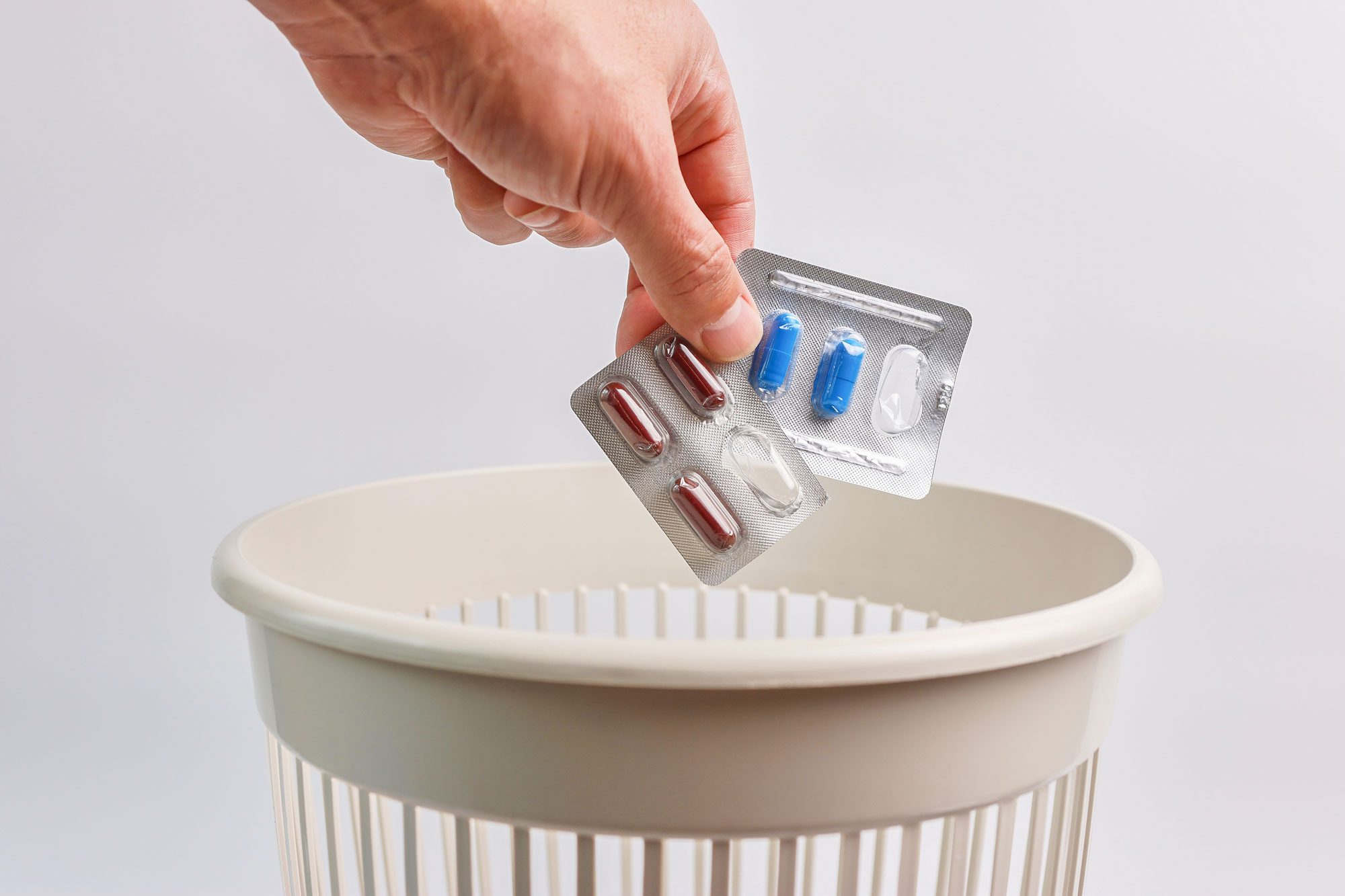
12 Common Household Items That Will Ruin Your Septic Tank


Coffee Grounds
At the top of this list of what not to flush down a septic tank is a common kitchen waste item that doesn’t readily dissolve. “Coffee grounds don’t break down and can add a sludge buildup,” advises Shaylin King, a licensed plumber. They sink to the bottom of the tank and pile up, reducing the amount of space in the tank for water. The same goes for eggshells.
What happens if you flush them
If you flush coffee grounds, you won’t notice the effects immediately, but your tank will fill up faster than it should, and you’ll have to have it pumped more often.
You’re unlikely to have a problem if you flush coffee grounds once or twice, but don’t do it regularly. The more often you flush grounds, the faster your tank will fill and the sooner you’ll have to pump it.
Safer alternatives
Put coffee grounds (and eggshells) in the trash or, better yet, use them as garden fertilizer. If your waste management service separates compostable items from landfill, put these items in with the compost.

Antibacterial Soaps
Antibacterial soaps kill beneficial bacteria in the septic tank, according to Omarr Picken, a plumber from Australia, and Ian Wood, a drainage and plumbing expert from the UK.
What happens if you flush them
If you use these soaps for washing and cleaning, and then flush them down the toilet or pour them into the sink drain, you’ll hinder the tank’s ability to decompose organic matter. The undigested matter ends up adding to the sludge layer or possibly even clogging the system.
Safer alternatives
If you flush antibacterial soap, you can’t undo that action, so — since you’re on a septic system — the best course is to switch to a non-antibacterial soap product.
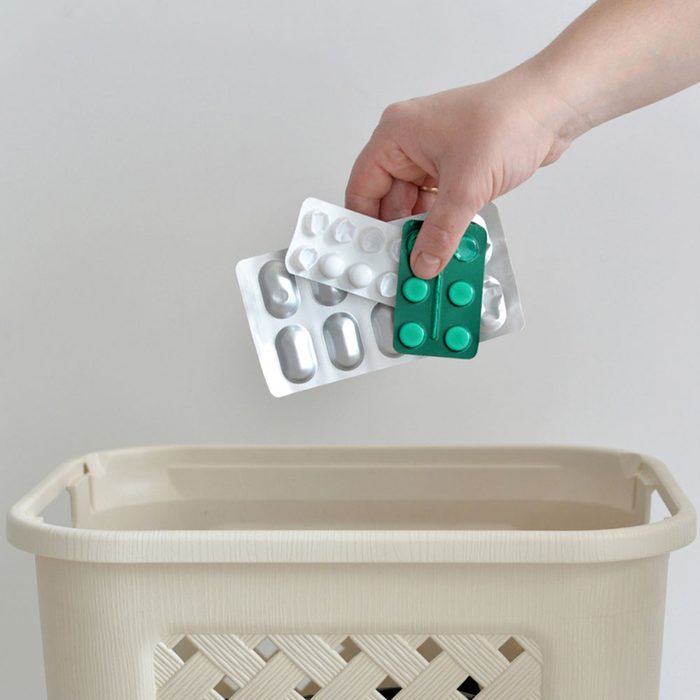
Medications
Flushing medications you aren’t using seems like an easy way to get rid of them, but they also belong on the list of what not to flush down a septic tank. “Medications being flushed down into the septic tank can cause a disruption in the natural bacterial ecosystem inside the tank,” says Shaylin King, who is a licensed plumber.
What happens if you flush them
Medications, especially antibacterial ones, can cause the same problems as antibacterial soaps, namely sludge buildup and clogging. Moreover, the ones that dissolve can flow into the drain field and contaminate the groundwater.
Safer alternatives
It may seem like a lot of trouble, but the safest way to dispose of medications is to collect them and dispose of them as hazardous waste.
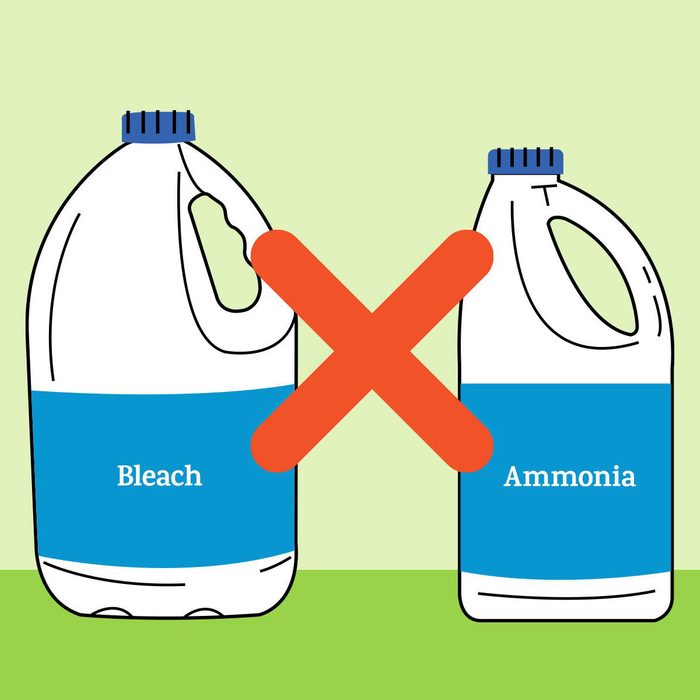
Harsh Cleaning Chemicals
Harsh cleaning chemicals like bleach are known for their ability to disinfect, and that may be a good thing for a swimming pool, but it’s bad for a septic tank or a drain field.
What happens if you flush them
“Folks don’t think about things like bleach or harsh cleaning chemicals and often do flush these into a septic system – these disrupt the good bacteria balance that is needed for a well maintained septic system,” advises Yesenia Soto, whose job is to research and develop drain cleaning products. What’s more, when they make it to the drain field, they can interfere with the organic balance of the soil.
The experts I interviewed all agreed that bleach probably won’t do any damage in small amounts, so don’t worry if you flush it once or twice, but don’t make a habit of it.
Safer alternatives
If you don’t have an alternative way to dispose of harsh cleaners, consider using alternative cleaning chemicals like vinegar, baking soda or hydrogen peroxide.
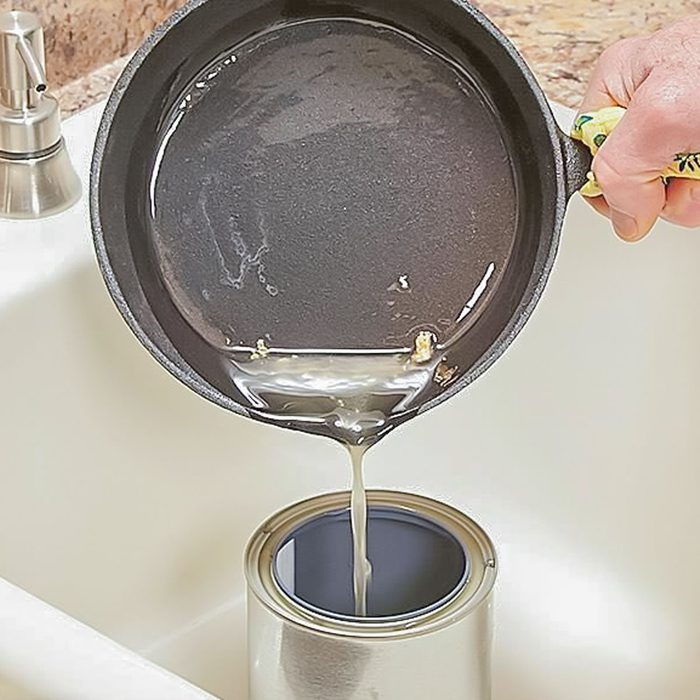
Cooking Oils/Fats
“Definitely avoid introducing cooking oils or fats” into your septic tank, cautions Soto. “This can create a blockage in your septic system.”
What happens if you flush them
Oils and fats don’t dissolve. They float on the surface of the water and eventually flow into the drain field, where they end up clogging the soil and hindering its percolation properties. When the odorous water can’t drain, it remains on the surface of the ground and slowly evaporates, broadcasting sewer smells in all directions. The only remedy is to move the drain field, which will be complicated and costly.
Safer alternatives
Allow oil, grease and fat to cool and solidify, then put it in a container and dispose of it in the trash.
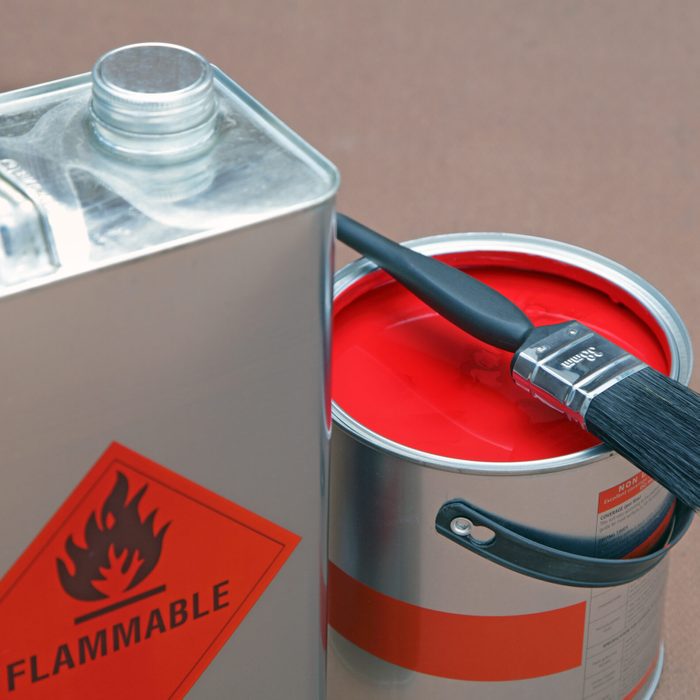
Paint and Paint Solvents
Who hasn’t washed their paintbrush in the sink? By itself, this probably won’t do much damage, but in general, paint and paint solvents belong on the list of what not to flush down a septic tank.
What happens if you flush them
Liquid solvents and water-soluble paints end up in the drain field, where Soto warns they can contaminate the groundwater. She cautions to avoid even flushing acetone-based nail polish remover.
Oil-based paints that don’t dissolve will sink to the bottom of the tank and add to the sludge layer.
Safer alternatives
Collect used paint and solvents in appropriate containers and dispose of them as hazardous waste.

Flushable Wipes
Don’t be fooled by the label “flushable” if you’re on a septic system. “Certain “flushable” wipes, do not break down that well and can cause blockages,” advises Picken.
What happens if you flush them
When flushable wipes don’t dissolve, they can clog the outflow pipes to the drain field and ultimately cause septic water to back up into the house. Moreover, any disinfectants with which they are treated can disrupt the chemical balance in the tank.
Safer alternatives
Flushable or not, put your used wipes in the trash.

Dryer Sheets
My house is on a septic system, and the dryer is in the main bathroom. That makes it tempting to flush used dryer sheets in the toilet, but we never do that. Some people do, though, and that’s a no-no.
What happens if you flush them
“Dryer sheets can clump and cause backups,” says King. Moreover, the chemicals with which they are treated, including sulfate salts, act as disinfectants and disrupt the chemical balance of the tank. Dryer sheets also contain nitrogen, which is a leading contributor to algae bloom that contaminate groundwater, according to Tri County Septic.
Safer alternatives
Put used dryer sheets in the trash.
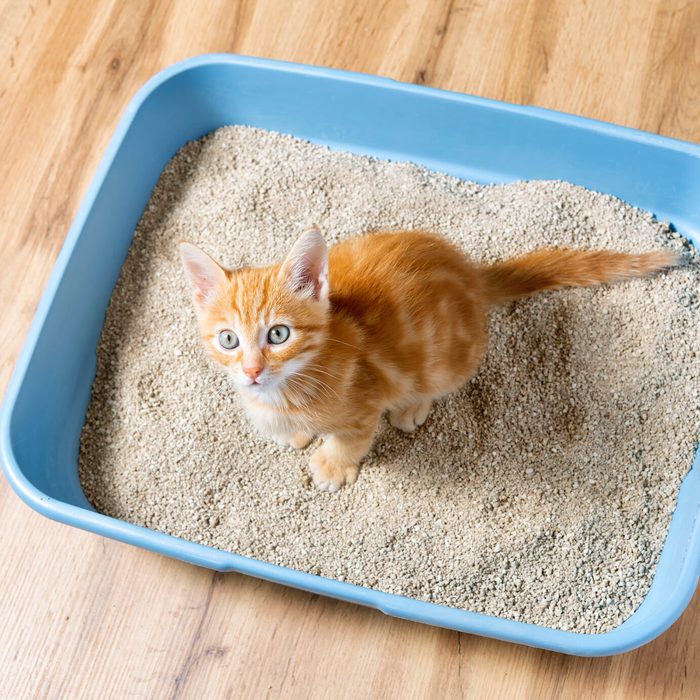
Cat Litter
Adding traditional cat litter to the list of what not to flush down a septic tank is a no-brainer, but some products are advertised as flushable and even septic-safe. However, Wood warns: “Things like cat litter (even the flushable stuff) can clog up your system or mess with the bacteria balance.”
What happens if you flush it
Even if cat litter is flushable, there’s no guarantee all of it will dissolve, and what doesn’t dissolve will settle into the sludge layer or possibly clog the outflow pipes and cause a septic backup.
Safer alternatives
Save the litter bag, use it to collect the used litter, and throw it away in the trash.
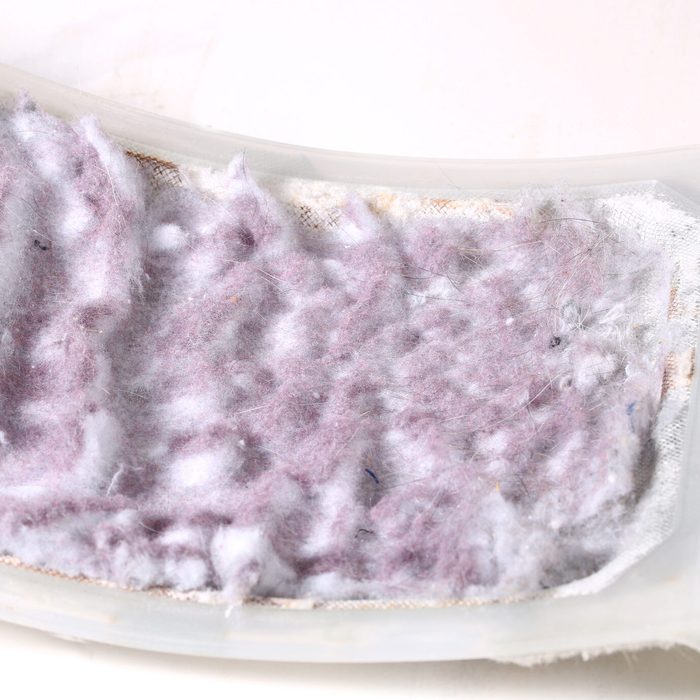
Washing Machine and Dryer Lint
Wood flagged washing machine and dryer lint as additions to the list of what not to flush down a septic tank, and if you’ve ever had a drain clogged by lint, you’ll know why. Lint, like hair, can get caught in pipe joints and provide a substrate on which other things can collect.
What happens if you flush it
The lint that floats can flow into the outflow pipes and cause clogs. Lint that doesn’t float sinks to the bottom of the tank and unnecessarily adds to the sludge layer. If your tank has a transfer pump, lint can gum up the pump mechanism.
Safer alternatives
Throw lint away in the trash.
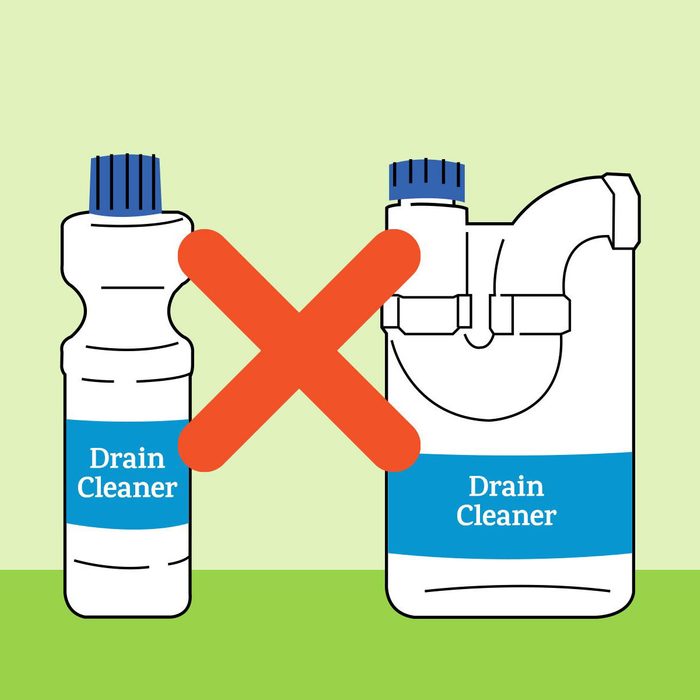
Heavy Duty Drain Cleaners
Picken cautions against flushing heavy-duty drain cleaners, which typically contain highly caustic chemicals like sodium hydroxide and sulfuric acid. They have the same effect on the bacterial balance in a septic tank as disinfectants and antibacterial soap, only more so.
What happens if you flush them
Alkaline and acidic drain cleaners work by dissolving organic matter, which is great for cleaning drain pipes but terrible for the microorganisms that promote digestion in a septic tank. When used in enough quantity, they can turn the contents of the tank into a stagnant mess. Besides that, they can also corrode metal pipes and pipe fittings.
Safer alternatives
If you’re on a septic system, you should avoid using harsh drain cleaners altogether. Use slower-acting and safer enzymatic drain cleaners. Soto recommends Green Gobbler Septic Saver Pods to help replenish beneficial bacteria and introduce enzymes. Other popular brands include Drano Max Buildup Remover (not the original Drano crystals, which contain sodium hydroxide) and Liquid-Plumbr Pro Strength Clog Destroyer Gel.

Dental Floss
Picken also cautions against flushing dental floss.
What happens if you flush it
Like hair and lint, dental floss doesn’t dissolve, and it can catch on fittings inside the tank and on outflow pipes where it collects other debris and causes clogs. It will also gum up the mechanism of your transfer pump, if you have one.
Safer alternatives
Throw dental floss away with the trash, or check out these creative uses for using it around the house.
About the Experts
- Yesenia Soto works in research and development at Green Gobbler.
- Omarr Picken has been a plumber for 30 years. He is the founder of OP Plumbing Services PTY LTD based in the Sydney, Australia.
- Ian Wood is a UK-based plumbing and drainage specialist who works for Reactive Plumbing & Drainage Ltd.
- Shaylin King is the owner of Mr. Rooter Plumbing of Eastern Washington, a Neighborly company.
Sources
- PubMed: In vitro effects of simulated gastric juice on swallowed metal objects: implications for practical management; (1997)
- Tri County Septic: Fabric Softeners, Dryer Sheets and Septic Systems; (2019)
RELATED:




















